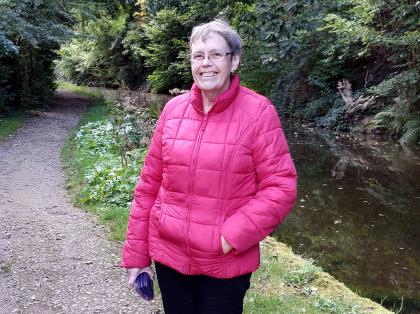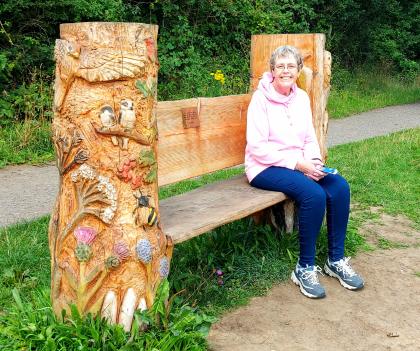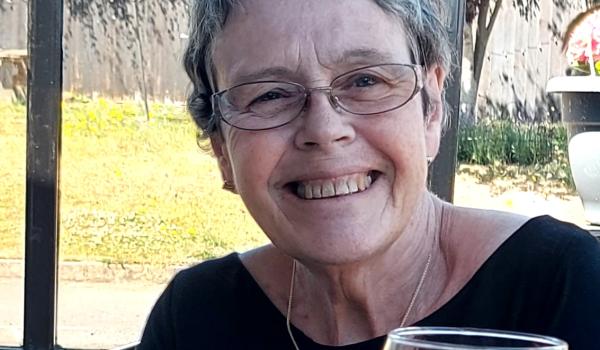Listen to Helen talk about her story
I knew nothing about the symptoms of ovarian cancer – if I'd have known I would have pushed to see my GP a lot earlier. When you get into your 60s, you think your body is supposed to change. Women don’t know what the symptoms are. We all need to know.
The summer before my diagnosis, I began to experience pain in my abdomen. It felt similar to period pain, and I dismissed this due to my age. By December I was really bloated and experiencing both constipation and diarrhoea at one point or another. My father died of bowel cancer, so I knew I needed to see my GP.
I thought if I had anything it would be bowel cancer – I never had ovarian cancer in my mind.
They initially suspected IBS but said they’d do a blood test due to my family history. This showed a high level of potassium, so I was sent for another test – which I now believe was a CA125 blood test.
I was later referred to a bowel specialist who informed me there were no bowel abnormalities but that I was being referred to the gynae team who sent me for a CT and ultrasound. By the end of the month I was diagnosed with ovarian cancer that had spread to the spleen, lymph nodes and near my liver. This was a huge shock.

A big decision
A month later I had initial surgery which determined the stage of my cancer – stage III. The plan was chemotherapy, then surgery and then more chemo. Things changed however, as an early slot became available for surgery, and I had less than a week to decide whether I wanted this alternative, ultra-radical surgery.
After discussion with my husband and kids I decided to go ahead with it. Looking back now that period was a big blur and I'm not sure how I managed it.
My local hospital has a list of people who have had the ultra-radical surgery that are willing to talk to others that are facing the same decision. I spoke to a lady called Maureen that was an amazing support. We spoke several times and by chance she called me the morning before my surgery. Without her I may have backed out.
My surgeon was delighted that they had been able to remove all visible signs of cancer and the operation had gone well. Chemotherapy started a few months after surgery and whilst it was tough, I was determined to be as positive as I could, and amazing support from friends and family helped me through.
After chemo finished, I met with my oncologist to decide future treatment – a combination of bevacizumab and olaparib which I take as a tablet four times a day.
Due to the loss of my spleen, I also now take penicillin. I'm still on this treatment today, determined to stay positive despite the aches and pains – but maybe that’s just my age!
Living my life
I have to really look at what I do now – I take it one day at a time which is something I've never had to do. I'm a get up and goer! Now, I have to think how am I feeling? Can I do this? Working in my local charity shop is amazing, and the Ovarian Cancer Community has been helpful – others have made suggestions on how to manage side effects, and it’s good to speak to women who are going through the same thing as me.

It’s been a very long journey for me, and whilst I've remained positive there are days where it’s not positive. It can be difficult to talk to friends as you don’t want things to be all about your cancer, but sometimes that’s all you can think about.
That's why I volunteer at the charity shop, it’s important that I do something else. I've also recently finished a CBT practitioner course and am currently going through a life coaching course. Life on the whole is good.
The emotional impact
When they first told me that I had ovarian cancer, to me it was a death sentence. I knew that people died of cancer. Though, the things you see and hear about cancer don’t portray it in its actuality. It took a year to really process everything – on the first anniversary of my diagnosis it hit me.
I have regular check-ups now, and it's quite hard to know what to say to consultants – you're always frightened that they might tell you that your cancer has come back. But I’m learning unless we are really honest with them, they cannot treat us. That means mentioning when you feel unwell, aches and pains that are different or anything that’s changed in the last month.
The word cancer itself used to say death to me. But things are moving so quickly that people in years to come will have so many more treatment options. I feel lucky now, but it will get even better.
Support
I wish my consultants told me about ovarian cancer charities opposed to me having to look for you. Because up until knowing Target Ovarian Cancer existed, I wouldn’t have known that there are positives to a cancer diagnosis, and support is always there.
I found the Ovarian Cancer Community, and all the women on there are extremely supportive. We also share milestones that we all celebrate for one another – seeing things like that helps get you through the day.
I’d say to anyone with a new diagnosis put yourself out there and ask for support. If you’re someone like me who’s never had to do this it can feel difficult, but you have to ask as people are willing.
If you’ve been affected by this story and would like to speak to a specialist nurse, you can call our dedicated support line on 020 7923 5475 or contact us: [email protected]. We're open from 9am until 5.30pm, Monday to Friday.
If reading this story has helped you, join the Ovarian Cancer Community to connect with more people affected by ovarian cancer: www.targetovariancancer.org.uk/onlinecommunity



